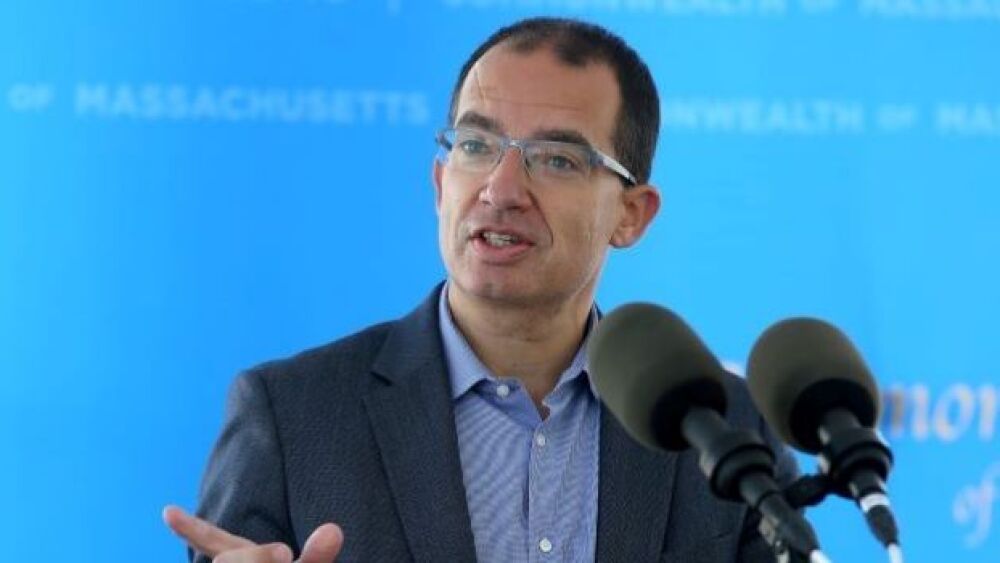Moderna roared through 2021 on the strength of its COVID-19 vaccine and that momentum is continuing in 2022.
Moderna CEO Stéphane Bancel / MediaNews Group / Boston Herald via Getty Images
Moderna roared through 2021 on the strength of its COVID-19 vaccine and that momentum is continuing in 2022. This morning, the mRNA giant forged a partnership with Carisma Therapeutics to develop and commercialize in vivo engineered chimeric antigen receptor monocyte (CAR-M) therapeutics for different forms of cancer.
The Multi-year research collaboration will combine Carisma’s engineered macrophage technology with Moderna’s mRNA and LNP technologies to generate and develop in vivo CAR-M therapeutics. The partnership, which Moderna will fund, could be aimed at up to twelve targets. Philadelphia-based Carisma will be responsible for discovering and optimizing development candidates, and Moderna will then take the assets into the clinic.
Stephen Hoge, president of Moderna, said the collaboration will expand the company’s oncology pipeline through a differentiated in vivo cell-therapy approach. At the same time, this will leverage Moderna’s core mRNA and LNP capabilities that will further expand the reach of Moderna’s technology.
Since its launch 10 years ago, Moderna has been advancing the potential of messenger RNA therapeutics. The company has a diverse clinical portfolio of vaccines and therapeutics across seven modalities. And that could rapidly expand as Moderna eyes the possibilities of 2022.
This morning, Moderna continues to scale its pipeline. The Cambridge, Mass.-based company has 40 programs in development, including 23 ongoing clinical studies that include mRNA infectious disease vaccines and mRNA therapeutics.
Looking back on the past year, Moderna Chief Executive Officer Stéphane Bancel said 2021 was a year of “incredible impact and growth for Moderna.” The COVID-19 vaccine has been administered to millions of people across the globe, providing protection against the respiratory virus that continues to pose a significant threat to global health.
The COVID-19 vaccine was the company’s first asset to hit the market under Emergency Use Authorization. Bancel stated that the success of that vaccine had spurred the development of its other programs. To date, Moderna has 23 mRNA programs in clinical trials.
“We will continue to advance mRNA vaccines that can have a profound impact on health and quality of life, including vaccines against respiratory viruses with the goal of bringing to market a pan-respiratory annual customizable booster vaccine,” Bancel said in a statement.
“In parallel, we are advancing first-in-class vaccines against latent viruses, which remain in the body for life and can cause lifelong medical conditions and we are also working to bring to market therapeutics based on mRNA-encoded proteins to help address multiple disease areas. We look forward to further leveraging our mRNA technology and delivery into gene-editing and other ways to impact human health.”
Bancel has touted the potential of mRNA-based vaccines. Last year, the CEO predicted mRNA vaccines will become a disruptive force in preventing viral infections and imagine the technology will have promising applications in other indications, including heart disease, cancer and rare diseases.
This morning, as the JP Morgan Healthcare Conference kicks off, Bancel will outline highlights and coming milestones in Moderna’s pipeline, including mRNA-1345, its investigational single-dose RSV vaccine for adults older than the age of 60, which earned Fast Track designation from the U.S. Food and Drug Administration. The first participants in a Phase II/III study of mRNA-1345 have been dosed.
Among the highlights, the CEO will discuss data showing that seasonal flu vaccine candidate (mRNA-1010) successfully boosted hemagglutination inhibition assay geometric mean titers against all strains. The company also dosed patients in the Phase III study of cytomegalovirus (CMV) vaccine candidate (mRNA-1647), as well as the Phase I study of Epstein - Barr virus vaccine candidate (mRNA-1189).
Outside of viral diseases, Moderna has launched a Phase I study assessing mRNA-2752 as a single agent and in combination with durvalumab (AstraZeneca’s Imfinzi) in patients with advanced solid tumor malignancies and lymphoma. Interim data has shown that the combination approach is well-tolerated at all dose levels.
Moderna is also in the process of building multiple mRNA manufacturing facilities across the globe in order to ensure that products will be readily available for global populations, particularly if other pandemics beyond COVID-19 arise.





